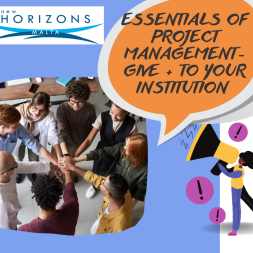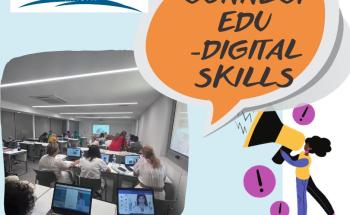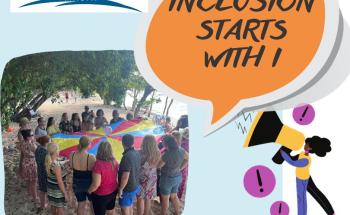
ESSENTIALS OF PROJECT MANAGEMENT- GIVE PLUS TO YOUR INSTITUTION WITH QUALITATIVE STANDARDS OF PMI
This training course is for individuals and institutions who manage projects on an informal basis or who may be interested in a career path in Project Management and desiring a complete overview of the field and its generally accepted practices.
8 training days format but at your request, the course can be structured for a shorter format of 7,6, or 5 days
Description
The training course aims at providing participants with the relevant skills to plan, manage and implement European projects in the fields of school education and training. The overall objective of the course is to give the right tools to set-up the international strategy of the school and to boost its European dimension.
1.EU strategy 2027Education and Research portal. Techniques for analyzing programs. Simulations and assessment of your learning. Agile project management
2. Partnership in projects submitted by other organizations: channels for finding partnerships. How to fill and submit the info sheet of your organization.
3. Acquire knowledge preliminary to submitting applications- time steps in submitting projects and filling the application forms: the structure of application form and of the projects.
4. Produce effective project ideas and structure them in work packages: the sources of inspiration for projects ideas. The structure activities by work packages.
5. Choose the most suitable project partners: the main official and unofficial channels for finding partners. Criteria for division of tasks among partners. Negotiation.
6. Describe in the application form the goal and the impact of your project: the correspondence between goal of the project and goal and priorities of the program.
7. The management of your project :tools for cooperation amongst partners. The project meetings. Tools for quality assurance.
8. Valorization of your project :the concept and components of valorization: dissemination, exploitation and sustainability. The tools for dissemination.. Goals and indicators for valorization. Drawing your dissemination and exploitation plan.
9. The budget of your project :the structure of the budget in European projects. Main cost categories and principles for budgeting: staff, travel and subsistence, equipment, subcontracting, other costs. Indirect costs, estimated income, financing.
Course evaluation
EACH DAY: Simulations and assessment.
Learning objectives
-support education centres EU competitiveness through the delivery of ideas, development of technology and processes, and innovative solutions for society's challenges;
-meet and cooperate with colleagues of different nationalities within the EU, engage in cross-cultural learning experience, exchange ideas and good practices.
-build a network for future international cooperation, promote mobility and partnerships in a multicultural environment, contribute to a cohesive society.
- organize and plan the project work for a successful implementation of the project activities and for achieving the expected project’s results.
- organize and manage the project partnership, monitor its work, prevent and address conflicts.
- monitor the project development, assess and evaluate the quality of its outcomes, deal with possible risks.
- create and deliver project reports both for internal and external purposes.
-find solutions to the ongoing challenges of sustainability
- organize and manage the financial and administrative issues of the project, as well as check the eligibility of costs.
Methodology & assessment
project working,practical laboratory,driven simulations,role-play, focus-group, daily
evaluation through self and group assessment. An innovative aspect is given by the fact that during the course the participants will design future Erasmus partnerships draft applications and future networking will be encourage. All our courses includes at least one VISIT TO LOCAL SCHOOL and the opportunity to interact with LOCAL TEACHERS
Certification details
At the end of the course, each participant will be awarded with the Europass Mobility Certificate, together with a descriptive certificate of attendance ( on the certificate will be specified the title of the course, name of the participant project, national reference number, numbers of hours, course dates and location). after participants enrollment, we provide also the learning agreement and the interinstitutional agreement. PREPARATION AND FOLLOW UP BEFORE:Every participant will have to fill a questionnaire which helps the trainers to customize the course to better fit their needs. Attendants will get instructions and material which will help them to be prepared for the courses needs. AFTER: The participants will get material which includes information about all the areas covered at the course, lesson plans , all the produced outcomes of the course, useful links and more.
Additional information
-
Language:English
-
Target audience ISCED:Early childhood education (ISCED 0)Lower secondary education (ISCED 2)Upper secondary education (ISCED 3)
-
Target audience type:Head Teacher / PrincipalGovernment / policy makerNot-for-profit / NGO staff
-
Learning time:25 hours or more
Upcoming sessions
Past sessions
More courses by this organiser

CONNECTEDU: INFORMATION AND COMMUNICATION TECHNOLOGIES (ICT) FOR NOWADAYS CLASSES

Inclusion starts with I – Learning to live together- 2024/2025


